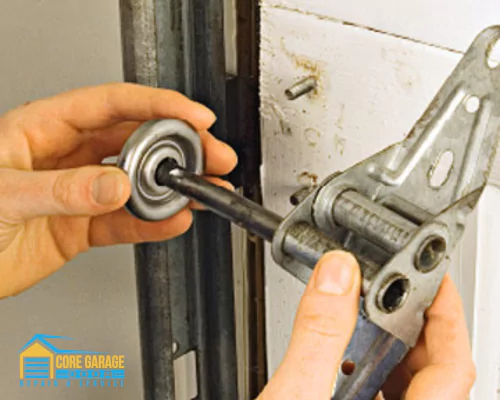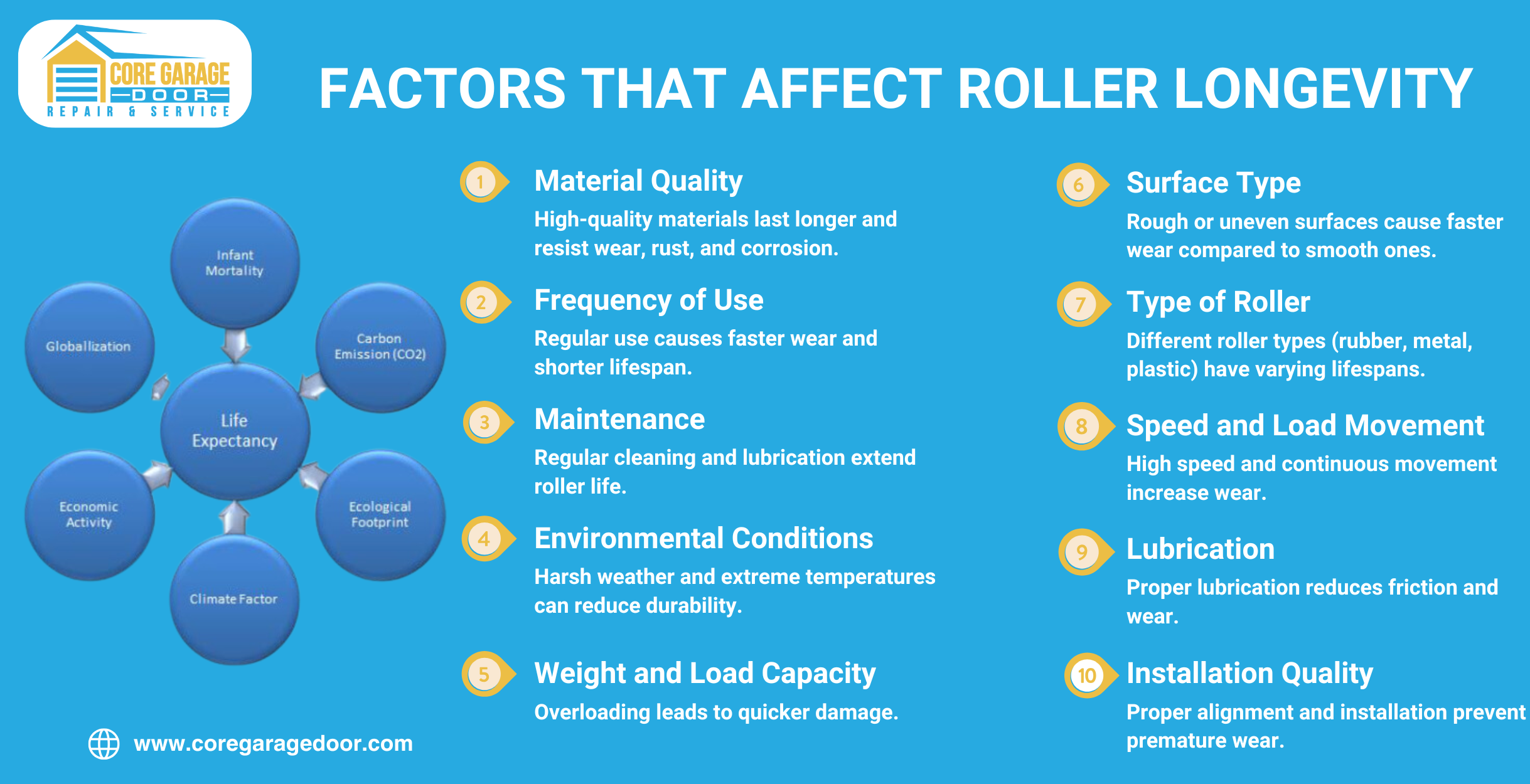
All homeowners looking for ways to maintain and upkeep the garage door pay attention to the rollers as that is the primary mechanism that ensures a long life. These rollers are small, but they play a vital role in the smooth and efficient operation of the garage door.
Small but vital parts contribute to the smooth operation of your garage door. But how long do garage door rollers last? The longevity of rollers depends on various factors such as the material, maintenance, and how often the garage door is used. Changing garage door rollers at the right time prevents larger, more expensive issues.
In this article, we will explore how long these rollers last, the signs that it is time to change rollers, and tips to extend their lifespan.

Common signs include increased noise, jerky movements, and slower door operation. If the door vibrates or moves unevenly, this could also point to worn-out rollers.
Additionally, if you notice visible wear or damage on the rollers themselves, it is time to consider replacing garage door rollers. Ignoring these signs can strain other parts of the garage door system, leading to costlier repairs in the future.
Replacing garage door rollers in a timely manner ensures smooth and safe door operation. Defective rollers can increase strain on the garage door opener and other hardware, causing them to wear out faster.
In severe cases, a faulty roller could lead to door misalignment or complete failure, risking your safety. By changing garage door rollers before they fully wear out, you maintain the efficiency and longevity of the entire garage door system.
So, how long do garage door rollers last? On average, the lifespan of garage door rollers varies depending on the material they are made from, their maintenance, and frequency of use. For example, high-quality rollers made from durable materials can last 10-20 years, while lower-quality ones may only last a few years. Regular inspection and cleaning will also play a role in determining how often you should replace rollers on a garage door.

Several factors can influence the life expectancy of garage door rollers, including:
Rollers come in steel, plastic, and nylon options, each with different lifespans.
Extreme temperatures and humidity can accelerate wear, especially for non-metal rollers. Nevertheless, there are ways to reduce the impact of climate. For example, you can lubricate the rollers to prevent environmental factors from impacting them.
Regular lubrication and cleaning prevent dirt build-up and reduce wear. A clean roller or channel means a longer-lasting garage door system.
A garage door used multiple times daily will wear down its rollers faster.
Keeping the tracks and rollers free of debris will extend their lifespan.
There are numerous materials used for rollers. Each of these materials may be suitable for individual garage doors. For example, steel rollers might not be suitable for a coastal location where rust can be problematic.
However, steel rollers are the most durable and strong, making them one of the best garage door rollers for heavy use. They might not be the best option if you live near a water body or if humidity is high in your area. Moreover, they can be noisy and require regular lubrication. With proper care, they can last up to 10-15 years, making them a good investment for high-traffic garages.
While affordable, plastic rollers typically have the shortest lifespan. They are prone to wear and break more easily, especially in extreme climates. In general, plastic rollers last around 2-3 years, so frequent users will likely need to replace rollers on garage door more often. Apart from being a light material, plastic does not wear or rust, but it can break or become friction-free over time.
Nylon rollers strike a balance between durability and noise reduction. They are quieter than steel rollers and more durable than plastic, lasting up to 10-20 years with proper care. This makes them ideal for homeowners looking for both longevity and smooth operation.
Maintaining your rollers is key to extending their life. Regular lubrication using oil designed for garage doors can reduce friction and prevent wear. Cleaning the tracks and rollers every few months also prevents dirt build-up, which can cause wear. Be proactive about replacing rollers on garage door when you notice any signs of wear.
Garage door rollers are a small component, but the door’s working relies on them. It is best to keep them oiled and free from rust so that they move smoothly. Oil can also protect these components from rusting. Lastly, limit unnecessary opening and closing of the garage door to reduce the strain on the rollers.
If you are unsure how to change garage door rollers, hiring a professional service like Core Garage Door is best. Their experts know how to replace garage door wheels efficiently and safely. Whether you are looking for replacement rollers for garage door or need guidance on how to measure garage door rollers, they offer the complete solution.
They can also help you understand the cost to replace garage door rollers and the benefits of using garage door bearings. Keeping your rollers in good condition is essential for a well-functioning garage door, and Core Garage Door provides top-notch service in replacing garage door rollers for long-term durability.
1. How can I tell if my garage door rollers need to be replaced?
2. What is the average lifespan of garage door rollers?
3. What factors affect the longevity of garage door rollers?
4. Can I replace garage door rollers myself?
5. How can I maintain my garage door rollers to extend their lifespan?
Core Garage Doors Offers Services Such As Garage Door Repair, Garage Door Installation, Garage Door Openers, And Garage Door Spring Replacement. Core Garage Doors With Its Headquarters And Training Facility In Dallas, TX Is One Of The Best Garage Door Repair, Installation And Service Provider And Our Staff Is Fully Capable To Handle All Your Door Related Needs.